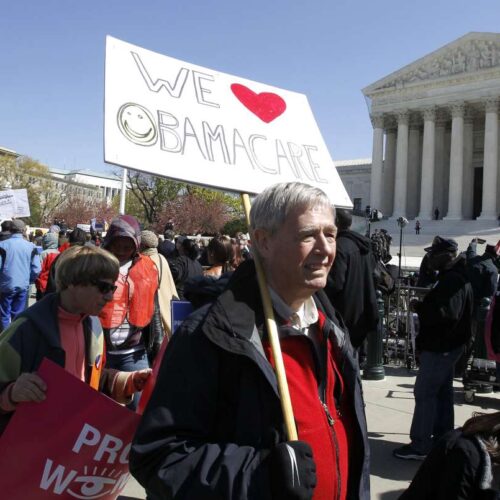Introduction
I learned that Mitt Romney had won the Nebraska Republican presidential primary last week via a “Breaking News” e-mail alert from POLITICO. It wasn’t the news from the Cornhusker state, however, that caught my eye. It was instead the health insurance industry’s decision to spend our premium dollars on an Internet ad — an ad warning of dire consequences if the Supreme Court doesn’t rule the way insurers want on the constitutionality of Obamacare.
The worst-case scenario for insurers is if the high court strikes down the provision of the law requiring us to buy coverage (the so-called individual mandate), but allows the law’s important consumer protections to go forward.
The reason Obamacare is built around the individual mandate is because of the relentless lobbying by insurers, and not just on Capitol Hill. Representatives of the industry made frequent trips to the White House during the debate on reform to twist the arm of President Obama, who had campaigned against the mandate when he was running for president.
The insurance reps were persuasive in arguing that the parts of the bill consumer advocates were demanding wouldn’t work unless an “enforceable personal purchase requirement” (a.k.a., the individual mandate) was also included, along with subsidies from the government to help low-income families pay their premiums. And not incidentally, insurers love the mandate because it forces millions more people to buy health insurance policies. The insurance folks made it clear that without the mandate and subsidies, the industry would spend whatever was necessary to defeat reform. So a deal was cut. The industry promised it would not try to destroy reform if it got the mandate, and it would even go along with some of what consumer advocates wanted.
One of the reasons the White House and Congressional Democrats agreed to the mandate was because they thought, foolishly, that including it in the bill might attract some Republican support. Not only would it ensure a viable private insurance market, it actually was first proposed by the Heritage Foundation, a conservative think tank. Who would have thought that the mandate would wind up being the most contentious part of the legislation and the basis of the constitutional challenge by Republican politicians that would ultimately reach the Supreme Court?
The health insurance industry, through its two big trade groups—America’s Health Insurance Plans and the Blue Cross Blue Shield Association—was quick to file an amicus brief when the high court announced it would take up the issue. They argued in the brief that the consumer protections in the law “are inextricably linked to the law’s personal coverage requirement and have to be severed if the court finds the coverage requirement unconstitutional.”
That was in January. Now that we’re getting close to June, when the court is expected to rule, the industry is rolling out a new phase of its campaign to make sure the consumer protections bite the dust—even, I’m willing to bet, if the justices decide to uphold the entire law.
The industry undoubtedly chose POLITICO for its ad because the news organization is widely followed inside the Beltway. Insurers were sending a message to the justices, reminding them of what they wrote in the amicus brief, and also to lawmakers on Capitol Hill, putting them on notice that should the court strike down only the mandate, insurers will be pulling out all the stops to make sure Congress guts the rest of the law.
“At a minimum,” as AHIP and BCBSA wrote in January, the protections that will have to go are the ones that require insurance firms to sell coverage to anyone who applies for it and that prohibit them from using pre-existing conditions and a person’s medical history to deny coverage or to charge exorbitant rates for it.
To bolster its case, AHIP is now pointing to what it claims were unintended consequences of certain reforms in the state of Washington several years ago.
“In the 1990s,” according to the POLITICO ad, “Washington State tried to implement market reforms without a mandate. By 1999, it was impossible for an individual to buy a health insurance policy in 31 of Washington’s 39 counties. Learn more about The Link between the individual mandate and market reforms at http://bit.ly/thelinkahip.”
Washington Insurance Commissioner Mike Kreidler confirmed to me that Washington lawmakers in 1999 rolled back some of the consumer protections that had been enacted six years earlier, but he’s not buying AHIP’s prediction that insurers would flee the marketplace if the Supreme Court declares only the individual mandate unconstitutional.
“I think that would happen only in the absence of other mechanisms and options to help reduce insurers’ risk,” Kreidler said. “For example, creation of an open enrollment period for these plans could minimize the likelihood of people jumping in and out of coverage when they have major procedures planned.
“Also, here’s what could be different from 1993,” he added. “If the individual mandate is thrown out but the Medicaid expansion and subsidies upheld, you’d likely have fewer people hopping in and out of the market because of those safety nets allowing them to get and keep coverage.”
Don’t expect the insurance industry to advertise that, though. They want those consumer protections gone. And they will be spending a lot of money in the months ahead to make us all think those protections are not in our best interests after all—regardless of how the court rules.
Read more in Health
Wendell Potter commentary
OPINION: Guess who would benefit from privatizing Medicare?
Insurers and their buddies want private profits at our expense, not real reform
Wendell Potter commentary
OPINION: Could nonprofit health insurance plans be the real reformers?
‘Consumer Oriented and Operated Plans’ have potential to topple the big guys, some say


Join the conversation
Show Comments